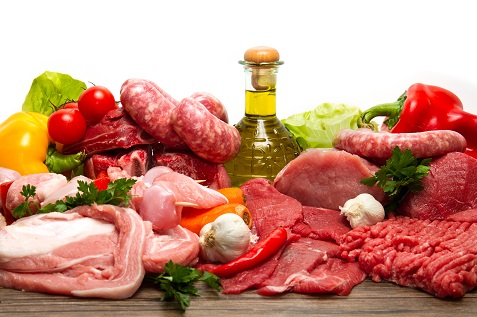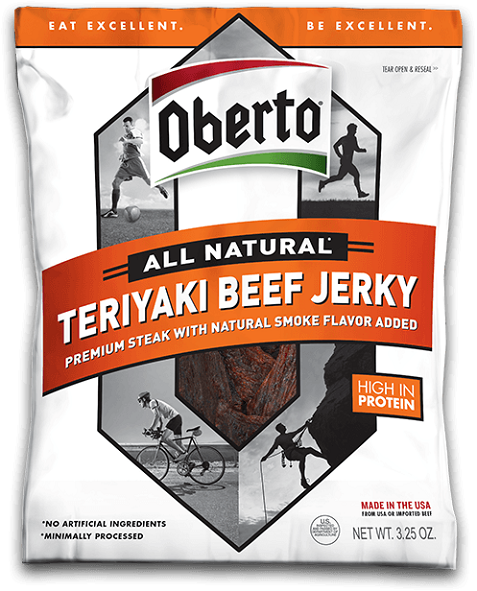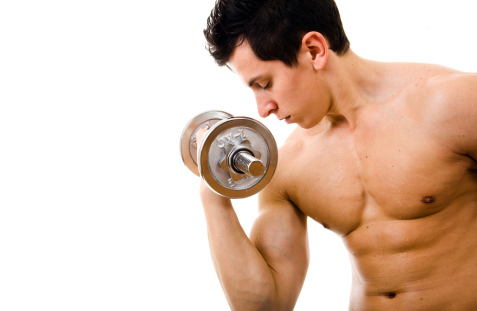Are you getting enough protein in your diet?
Posted by Bullz-Eye Staff (05/22/2015 @ 8:01 am)

Protein is a vital part of any diet. It’s the crucial component that helps our bodies to grow and repair – vital for everyone from the elderly to the super-fit bodybuilder.
So how do you get enough of this in your diet?
First things first, you need to know how much protein you actually need to consume. There are various formulas that can help with this but the British Nutrition Foundation states that your recommended intake is about 0.75g per kilogram of body weight per day for adults – that’s typically about 56g a day for men and 45g for women.
Read the rest of this entry »
Posted in: Lifestyle
Tags: protein
Oberto Beef Jerky
Posted by Gerardo Orlando (11/08/2014 @ 2:53 pm)

You’ve seen the commercials for Oberto Beef Jerky featuring athletes like Richard Sherman and Clint Dempsey with Stephen A. Smith as the “Little Voice In Your Stomach.” Whether you like the commercials or not, I’m pretty confident you’ll love this beef jerky. I tried both the original beef jerky and the Teriyaki beef jerky from Oberto and both were delicious. The products are all-natural with no preservatives or artificial flavors and of course they’re packed with protein. There are tons of other flavors so I’m pretty sure you’ll find several that you like.
Read the rest of this entry »
Quantity versus Quality: Solving the Protein Puzzle
Posted by Bullz-Eye Staff (08/30/2014 @ 11:35 am)

Protein, essential for life and good health, is somewhat of a puzzle to those who want to understand how to stay healthy and maintain a good weight. We know protein is essential, but many don’t know too much information beyond that.
Is there a limit to how much we should ingest? Should we depend on alternative sources like vitamins and powders for added protein? Is it unhealthy to opt for a vegetarian or vegan diet?
How Much Protein Should We Eat?
American doctors suggest a minimum of 8 grams of protein per 20 pounds of body weight. The Institute of Medicine suggests that protein account for 10% to 35% of caloric intake. Aside from medicinal recommendations, there’s little evidence of a ‘magic number.’ In America, recommended daily intake is 46 grams for adult women and 56 grams for men. But, why do we need protein at all?
Read the rest of this entry »
HMB and Fitness
Posted by Bullz-Eye Staff (07/15/2013 @ 7:19 am)

A healthy diet and regular workouts are the two key ingredients to developing fitness, but to push your body that extra level by building serious muscle many top athletes use supplements such as HMB.
HMB (beta-hydroxy-beta-methylbutryate) is a branch of the amino acid Leucine: a substance found in protein-based food like fish and chicken. However, HMB is in short supply and so the body cannot feel its benefits as much as it could do if given a larger dose.
An Ironmagazine.com report in 2010 discusses how the supplement helps protect the breakdown of muscle proteins and actively stimulates tissue growth, so you can take it either before or after exercise and you’ll get the best of both worlds. Studies have shown that leucine contributes to protein synthesis, especially the small amounts of HMB already in the body. Any addition, therefore, is beneficial when building muscle and you only need a small dosage – three grams per day – to boost your recovery and enlarge skeletal muscles.
Combine this dosage with regular exercise and a good diet or protein and vegetables – plus carbohydrate intake before you work out to fuel the body through intense periods – and you’ll soon discover you’re getting fitter and stronger.
According to Bodybuilding.com, those who take HMB over a three-week period are more likely to bench-press greater weights than others taking a placebo. The supplement is also used to increase fatigue endurance during long bouts of physical exercise, so you can work out for longer and push through previously unreachable targets.
Remember, HMB services all muscle protein so you should set targets in both the lower and upper body to reap the supplements full benefit. Try setting a simple timed 100 press-up target alongside a reasonably weighted leg-press target and see if you can beat it each day. The more you exercise and take the supplement the stronger you should become and that time will drop off the clock.
Achieving your physical peak is difficult without the aid of supplements such as HMB, which have proven beneficial for both men and women over long periods of time.
Nutrition Principles
Posted by Bullz-Eye Staff (06/18/2012 @ 8:00 am)
 Did you read Mike Furci’s recent article about getting in shape for summer? If you’ve hit the pool and weren’t happy with how you looked without a shirt, then you might want to give it a read. You should check out the entire article, but here are Mike’s nutrition principles for consistent, healthy eating that will help you get lean and mean.
Did you read Mike Furci’s recent article about getting in shape for summer? If you’ve hit the pool and weren’t happy with how you looked without a shirt, then you might want to give it a read. You should check out the entire article, but here are Mike’s nutrition principles for consistent, healthy eating that will help you get lean and mean.
If you’re hungry, eat. If you’re not, don’t.
Under no circumstances should you count calories, ever.
Avoid calorie-dense fast foods. (Mainly processed, fast foods, fruit juice, soda pop and other high-carb foods.)
Plan your meals, and prepare your food in advance. This is perhaps the single biggest contributor to consistent healthy eating. You’re less likely to fall off the wagon if there is quality food already made.
Eat at least four meals per day. Your goal should be to eat six times per day, once every two to three hours. A healthy snack, e.g., vegetables, cottage cheese, sugar-free yogurt, etc., is considered a meal.
Make sure to eat a portion of protein with every meal. If your meal consists of a starchy carb, always consume a bit of your protein first. This ensures a lower glycemic index for the meal and will curb eating too many carbs.
A portion of protein is four to eight ounces, or a portion is about the size of the palm of your hand or a clenched fist.
Choose carbohydrates that are on the lower end of the glycemic index. Refer to the Approved Foods chart.
Whenever time is of the essence, use meal replacement packs, protein powders and drinks, cottage cheese, yogurt, etc. This takes the guesswork out of meal planning during a busy day.
Use natural unprocessed fats and oils for cooking and salad dressings. Avoid using, or strictly limit, your consumption of polyunsaturated fats (vegetable oils) and never cook with them.
If you want to get healthy, look better and feel better, you need to learn more about how to eat. Read this article and then read Mike’s columns regularly.
Posted in: Fitness
Tags: approved foods chart, authorized foods, avoid fast food, calorie dense foods, calories, carbohydrates, don’t count calories, eat when you're hungry, eat when you’re hungry, eating habits, fat, feel better, get in better shape, getting in shape, glycemic index, look better, nutrition guidelines, nutrition principles, planning meals, protein





 Did you read Mike Furci’s recent article about
Did you read Mike Furci’s recent article about 








